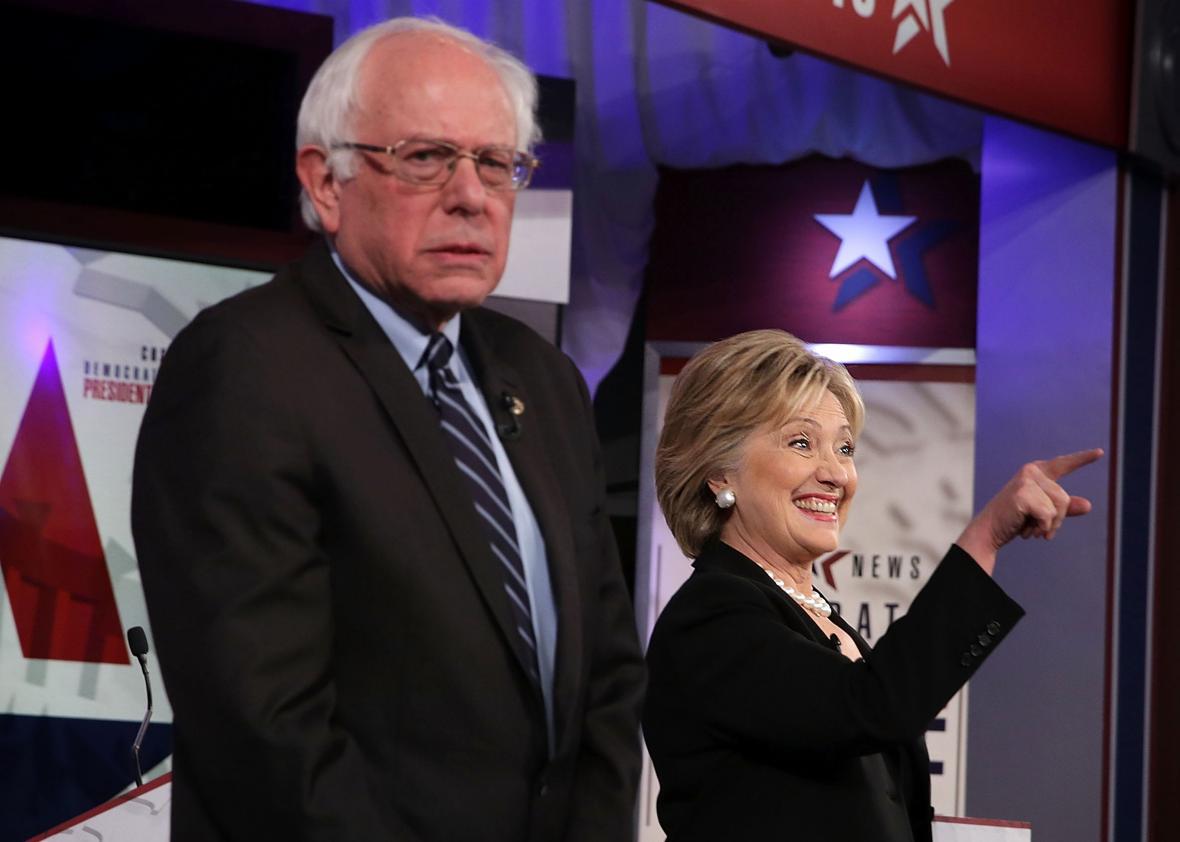After weeks and weeks of GOP-dominated campaign news, Democrats Hillary Clinton and Bernie Sanders will square off in New Hampshire on Saturday night for their third debate of the year. (We’re told central casting will send its usual extra to stand behind the third podium on stage.) Plenty has happened in the month since their last get-together, but little has changed in the Democratic race: Clinton remains the prohibitive favorite for her party’s nomination, and Sanders has been unable to change that.
Here’s where things stand for the two main candidates heading into this weekend:
Hillary Clinton
Hillary’s chief goal for Saturday is the same that it has been every other day of the primary: just don’t mess this thing up. Her campaign hasn’t been without its bumps (see: email account, private) but ever since things broke her way during a several-day stretch in October—a surprisingly strong first debate; the bursting of the Joe Biden bubble; the overreach of Benghazi-obsessed House Republicans—its been smooth sailing for the former secretary of state.
Clinton isn’t coasting, exactly. Just this week she appeared with President Obama’s favorite tax-the-wealthy prop, Warren Buffett, and vowed that she’d go beyond Obama’s proposal to hike taxes on the richest Americans. But she’s certainly not sweating either (tellingly, her campaign says she’ll wait until closer to the general election to release any specifics on that tax hike plan).
Clinton has no reason to veer off her charted course. She has a commanding lead in the national polls (RealClearPolitics average: 25.2 points), as well as in Iowa (17.7 points), which will kick off the nominating contest in a little more than six weeks. While Bernie currently has the edge in New Hampshire, a win there would likely only prolong the inevitable given Hillary’s southern firewall and super-delegate safety net.
Meanwhile, there are two major forces working in Clinton’s status-quo-protecting favor. The first is her friends at the Democratic National Committee, who capped the number of primary debates at six and buried three of the four pre-Iowa events on weekend nights in a not-so-subtle favor to their preferred candidate. Fewer than 9 million people tuned into the Democrats’ last weekend debate—a fraction of the number Republicans have drawn on week nights, aka times people actually watch television—and it’s difficult to imagine many more will decide to tune in for episode three on the weekend before Christmas. Assuming Hillary doesn’t pull a Rick Perry-style “oops” and then try to cover it up with a Star Wars spoiler, many voters will have forgotten this debate by Monday morning. That’ll be A-Okay with Team Clinton.
The second force working in Hillary’s favor? Donald J. Trump. Clinton was able to use her foreign policy credentials to her advantage during the last debate—which took place just one day after the terrorist attacks in Paris—but the recent Trumpification of the national security conversation only plays further into her hands. There are very real differences between Clinton and Sanders on national security (like most issues), but the gap between them looks tiny compared to the gaping chasm that has emerged between Republicans and Democrats in the wake of Paris and the mass shooting in San Bernardino, California. As long as Trump and the GOP continue to dominate the national conversation—and scare the hell out of Democratic voters in the process—Clinton can, and will, train her focus squarely on them, leaving Sanders to debate himself.
Bernie Sanders
Trump’s existence has been a major boon to Clinton, but he’s had an even bigger impact on Sanders—just not in a good way. Bernie’s campaign has always been more about his cause than his candidacy. But while he has had some success pulling Hillary to the left, his job gets significantly more difficult every day Trump commandeers the news cycle with his outlandish bluster. The Democratic race may be more substantive (and fact-based), but the Republican contest has proved an order of magnitude more interesting for most Americans, in large part because no one seems to have any idea how it will play out. Bernie is calling for a political revolution, but many of his would- and could-be supporters are too busy watching the GOP reality show to hear him.
Consider Bernie’s plight: Earlier this month, he became the first major presidential candidate to explicitly call for a carbon tax, a major proposal that once again puts him far to the left of Clinton on climate change. The problem? That same day Trump called for a “total and complete” ban on Muslims entering the United States. In the weeks since, Sanders’ has toured the Baltimore neighborhood where Freddie Gray died in policy custody, reported being on pace to set a new small-donation fundraising record, and locked up two major endorsements, one from a union and one from a large grassroots organization. Those are on-message news events for his campaign—but they just can’t compete in a media cycle being dominated by foreign policy and the GOP’s brokered-convention strategizing to defeat Trump. (On Friday, Bernie finally found himself in the headlines—but only after he had to fire one of his staffers who was caught looking at Clinton voter data he shoudn’t have been.)
Sanders does still have a nuclear option that he could deploy to maximum effect on the debate stage: Going negative on Hillary. Doing that would break his campaign promise and go against his policy-above-politics mission statement—but it would also end his coverage drought and could kick-start his stalled campaign. There is no indication that he’ll do it, though. Bernie appears content to play his own game for the remainder of the race, even if that means it ends sooner than he’d like.
